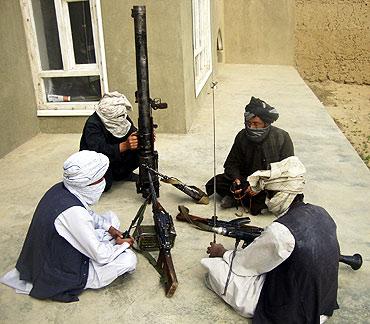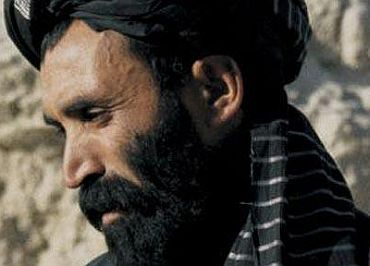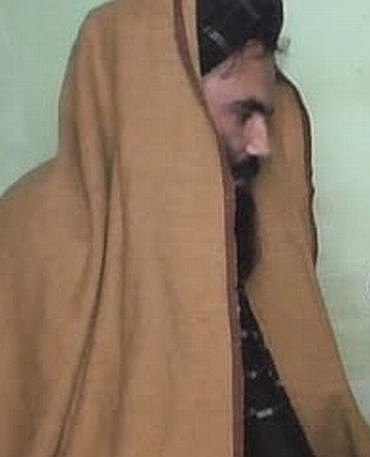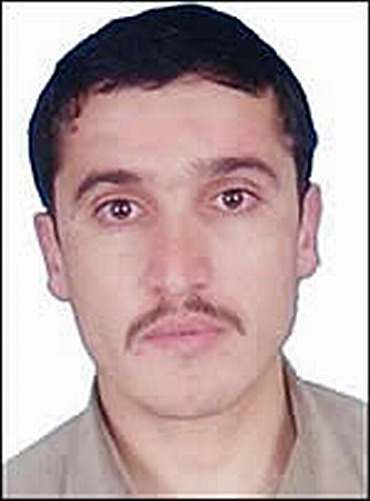This article was first published 14 years ago
Home »
News » In PHOTOS: Pakistan's terror quartet after Kashmiri
In PHOTOS: Pakistan's terror quartet after Kashmiri
Last updated on: June 5, 2011 10:19 IST
Image: Taliban fighters pose with weapons as they sit in their compound at an undisclosed location in southern Afghanistan
The death of Ilyas Kashmiri comes as a big blow to terror outfits in Pakistan. After having lost two leaders -- Osama bin Laden and now Kashmiri -- Al Qaeada is finding itself on the back foot, say sources from the Intelligence Bureau.
The IB says that while the death of bin Laden was a huge loss for the Al Qaeda, the killing of Kashmiri will hurt even more. Bin Laden was not that active as far as operations of the outfit were concerned and was more of a motivator.
But that was not the case with Kashmiri as militants relied heavily upon him for training.
An expert on the battleground it is suspected that it is Kashmiri, who imparted training to the terrorists who staged the 26/11 attack. Kashmiri specialised in fidayeen strikes and his means were always fierce which made him even more deadly, security agencies also point out.
He leaves behind a huge vacuum among terror groups, which is hard to fill. However, it would be too optimistic to say it is curtains down for the Al Qaeda, as they have a line up of dreaded terrorists ready to take on the reins. The three faces of terror in Pakistan who will lead from the front are -- Ayman al-Zawahiri, Mullah Omar, Sirajuddin Haqqani.
...
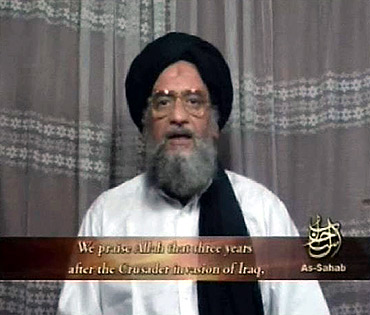
Image: Al Qaeda's deputy leader Ayman al-Zawahri
Photographs: Reuters
Ayman al-Zawahiri:
A physician and the founder of the Egyptian Islamic Jihad al-Zawahiri opposed the secular Egyptian government and sought to overthrow it. In the year 1998, the EIJ merged with the Al Qaeda. His prime target has always been the United States.
Considered to be the successor to bin Laden, some of his high profile crimes include his role in the August 7, 1998, bombings of the United States embassies in Dar es Salaam, Tanzania, and Nairobi, Kenya.
Image: Taliban's Mullah Omar
Mullah Omar:
On May 23, reports claimed that Taslban's Mullah Omar was killed, but the terror group said their leader is alive and "living in a safe place."
According to the Federal Bureau of Investigation, Omar's Taliban regime in Afghanistan sheltered bin Laden and his network in the years before the 9/11 attacks.
Although Operation Enduring Freedom (official name for the US government's war in Afghanistan) defeated the Taliban regime, Omar remains at large and poses a continuous threat to the US and its allies. He is not actively involved in warfare but has a big say in the affairs of both the Al Qaeda and the Taliban.
Image: Sirajuddin Haqqani
A top Taliban commander, he became the face of the Haqqani network after he took over from his father Jalaluddin Haqqani. The Haqqani network and the Qaeda have now join hands with Sirajuddin in charge of the operations of the terror groups. This has got the US worried.
The US says that the Haqqani network helped plan the suicide bombing against the Central Investigation Agency base in Afghanistan in December that claimed the lives of CIA operatives and and a Jordanian intelligence officer. In addition to this, India also believes that Sirajuddin has been recruiting troops and has turned his focus to Kashmir.
Image: Atia Abdur Rehman
Atia Abdur Rehman:
The number three man in the Al-Qaeda today operates out of Pakistan. He was one of the closest associates of Bin Laden and has been controlling operations to a large extent against US forces. He was the Al Qaeda's emissary based in Iran before coming into Pakistan to assist Bin Laden.
